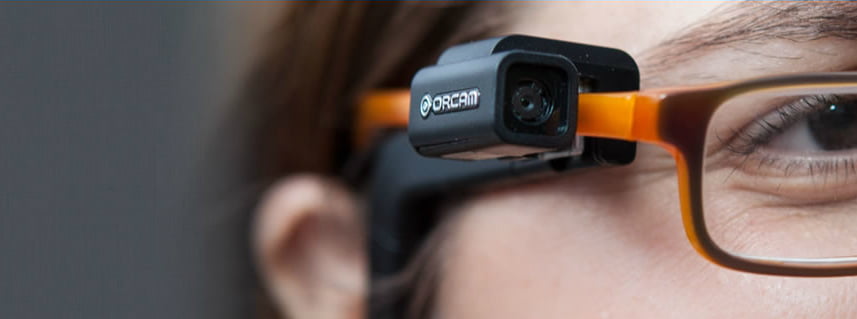Liat Negrin, an Israeli who has been visually impaired since childhood, walked into a grocery store here recently, picked up a can of vegetables and easily read its label using a simple and unobtrusive camera attached to her glasses.
Ms. Negrin, who has coloboma, a birth defect that perforates a structure of the eye and afflicts about 1 in 10,000 people, is an employee at OrCam, an Israeli start-up that has developed a camera-based system intended to give the visually impaired the ability to both “read” easily and move freely.
Related articles
- Researchers Find Way To ‘Reactivate’ Blind Eyes
- RAY: The Israeli Smartphone For The Visually-Impaired
Until now reading aids for the visually impaired and the blind have been cumbersome devices that recognize text in restricted environments, or, more recently, have been software applications on smartphones that have limited capabilities.
In contrast, the OrCam device is a small camera worn in the style of Google Glass, connected by a thin cable to a portable computer designed to fit in the wearer’s pocket. The system clips on to the wearer’s glasses with a small magnet and uses a bone-conduction speaker to offer clear speech as it reads aloud the words or object pointed to by the user.
The system is designed to both recognize and speak “text in the wild,” a term used to describe newspaper articles as well as bus numbers, and objects as diverse as landmarks, traffic lights and the faces of friends.
[youtuber youtube=’http://www.youtube.com/watch?v=ykDDxWbt5Nw’]
![]() It currently recognizes English-language text and beginning this week will be sold through the company’s Web site for $2,500, about the cost of a midrange hearing aid. It is the only product, so far, of the privately held company, which is part of the high-tech boom in Israel.
It currently recognizes English-language text and beginning this week will be sold through the company’s Web site for $2,500, about the cost of a midrange hearing aid. It is the only product, so far, of the privately held company, which is part of the high-tech boom in Israel.
Sign up for our free weekly newsletter
SubscribeThe device is quite different from other technology that has been developed to give some vision to people who are blind, like the artificial retina system called Argus II, made by Second Sight Medical Products. That system, which was approved by the Food and Drug Administration in February, allows visual signals to bypass a damaged retina and be transmitted to the brain.
The OrCam device is also drastically different from Google Glass, which also offers the wearer a camera but is designed for people with normal vision and has limited visual recognition and local computing power.
OrCam was founded several years ago by Amnon Shashua, a well-known researcher who is a computer science professor at Hebrew University here. It is based on computer vision algorithms that he has pioneered with another faculty member, Shai Shalev-Shwartz, and one of his former graduate students, Yonatan Wexler.
“What is remarkable is that the device learns from the user to recognize a new product,” said Tomaso Poggio, a computer scientist at M.I.T. who is a computer vision expert and with whom Dr. Shashua studied as a graduate student. “This is more complex than it appears, and, as an expert, I find it really impressive.”
The advance is the result of both rapidly improving computing processing power that can now be carried comfortably in a wearer’s pocket and the computer vision algorithm developed by the scientists.
…
To continue reading this article, click here.
Via The New York Times
Photo by OrCam
Related posts

Editors’ & Readers’ Choice: 10 Favorite NoCamels Articles

Forward Facing: What Does The Future Hold For Israeli High-Tech?

Impact Innovation: Israeli Startups That Could Shape Our Future




Facebook comments